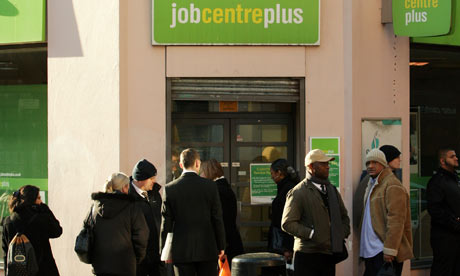 |
| They Govern in the interests of Capitalist profit |
The only way capitalism gets out of a slump is when profit-making opportunities reappear. When they do, “growth” resumes. This means that, in a slump, any government must not do anything that will adversely affect profitability and profit-making prospects. Just the opposite, it must encourage these. That is, if it is going to do anything. Another option is to simply let spontaneous economic forces operate to restore profitability, as through unprofitable firms going bust and their assets passing cheaply to their rivals and increased unemployment pushing down wages.

 |
| Job Centres with Nothing to Offer |
The second way a government can help restore profitability is to reinforce the downward pressures that mass unemployment exerts on wage levels. Two recently announced measures openly proclaim this as their aim.
The Chancellor confirmed that national pay bargaining for public sector workers is to be replaced by regional bargaining on the grounds that the present system results in wage levels in some regions being too high, so high that to attract workers employers have to pay higher wages than otherwise. The aim of regional pay bargaining is to reduce wages –and so boost profitability –in areas of the country where public service workers are considered to be overpaid.The minimum wage is to go up in October but by only half the rate of price increases. So, it’s going to be reduced in real terms. For those under 21, the rate is not going to be increased at all. Business Secretary Vince Cable justified this on the grounds that it would make it easier for young people to get a job. That the lower wage is aimed at boosting the profit prospects of firms employing workers on the minimum wage.
But what about taxes on the rich that have also been announced? That’s a side-show. “Tycoon taxes”, “Mansion Taxes” and the like are not taxes on profits, but taxes on the consumption of the capitalist class. A government can safely increase them in a slump as they don’t affect profitability. This even has the political advantage of allowing them to justify the austerity measures imposed on the rest of the population as “fair” as even the rich are affected.
| They enjoy the spoils of our ruined lives under the profit system |
It is true, though, as the Labour Opposition has been quick to point out, that this propaganda ploy has been rather undermined by the government’s reduction of the rate of tax on incomes over £150,000 from 50 to 45 percent, supposedly to attract overseas businesspeople to come to invest in Britain. But, as the traditional party of the rich, the Tories can’t clobber their clientele too much.
There is no alternative under capitalism.
As long as capitalism lasts all governments have to pursue a policy of giving priority to profits. Profits before people is the rule. It’s why we need World Socialism.

